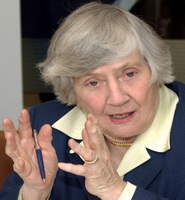 On Tuesday 17th November the Rt. Hon. Professor Shirley Williams delivered the 2009 Alcuin lecture at the Law Faculty, discussing the future of the European Union after the Lisbon Treaty.
On Tuesday 17th November the Rt. Hon. Professor Shirley Williams delivered the 2009 Alcuin lecture at the Law Faculty, discussing the future of the European Union after the Lisbon Treaty.
Shirley Williams, Baroness Williams of Crosby, was one of the 'Gang of Four' moderate Labour politicians who in 1981 founded the Social Democratic Party (SDP), which merged with the Liberal Party in 1988 to form the Liberal Democrats.
Baroness Williams was first elected as an MP in the 1964 General Election to represent the Labour Party in the constituency of Hitchin, Hertfordshire. She rapidly rose to a junior ministerial position and subsequently served as Shadow Home Secretary of State for Prices and Consumer Protection, Secretary of State for Education, and Paymaster General until she lost her seat in the general election of 1979.
In 1981 she resigned from the Labour Party to form the SDP, along with Roy Jenkins, David Owen and Bill Rodgers. Later that year she won the by-election for Crosby in Merseyside to become the first elected SDP MP. After losing her seat in 1983 she became a familiar face as a broadcaster on In conversation with Shirley Williams and has appeared on the BBC's Question Time more than any other panellist.
In 1988, Williams moved to the USA as Professor of Elective Politics at Harvard's Kennedy School of Government until 2001. She helped draft constitutions in Russia, Ukraine and South Africa, served as a UN Special Representative to the former Yugoslavia, and has been President of Chatham House, the Royal Institute for International Affairs. With Amartya Sen, she is a director of the US-based Nuclear Threat Initiative, which seeks to reduce the risk of use of nuclear, biological and chemical weapons; and in 2007 was appointed by the Prime Minister as an independent advisor on nuclear proliferation.
The Alcuin lectures are named after the 8th century scholar Alcuin of York, who was a key advisor to the Emperor Charlemagne and a central figure in the Carolingian Renaissance. The lectures were established in 1999 with a benefaction from Lord Brittan, himself a former European Commissioner. The theme for the lecture must be some aspect of the relationship between Britain and the European Institutions. Previous speakers have included Lord Patten, Lord Hannay and Dr Carl Bildt.
The lecture is available to listen to or download online.

 Facebook
Facebook  X/Twitter
X/Twitter  Instagram
Instagram  YouTube
YouTube  Flickr
Flickr  LinkedIn
LinkedIn